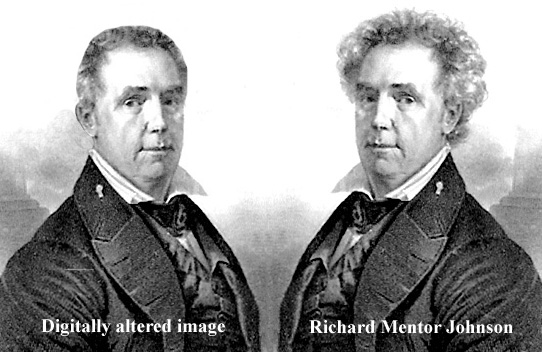
Unable
to find an image of the man for whom Johnson County is named, the author
visited the Library of Congress on the internet
to obtain what may be the first image of Johnson ever published locally. Then,
wondering what eliminating the teaseled
hairdo might produce, the author created the mirror image on his home
computer.
|
By
Bob Hibbs
An
Indian fighter and war hero who took a slave as his wife, the county’s
namesake was “a man of rough frontier manners and unconventional habits,”
writes current-day historian Henry Robert Burke. The subject was U.S. vice
president when the county was named.
While
part of the Territory of Wisconsin, the boundaries of Johnson County were
designated and named on Dec. 21, 1837, by the Wisconsin legislature meeting in
what is now Burlington, Iowa. Wisconsin was subdivided the following Fourth of
July to create the Territory of Iowa.
The
county’s namesake is Richard Mentor Johnson, who served an undistinguished
term as vice president during the one-term administration of Martin Van Buren
from 1837 into 1841.
Despite
an overwhelming victory by Van Buren and Van Buren’s support, Johnson
didn’t receive an Electoral College majority. However, the
president-elect’s support did win Johnson a narrow election by the U.S.
Senate during an era when the president and vice president were elected
separately.
Although
his wife had died before the 1836 election, Johnson never challenged
opponents’ claims that she was a mulatto slave and mother of his daughters.
He responded: “I married my wife under the eyes of God, and apparently He
has found no objections.”
There
were objections among opponents, particularly in the South, where it was
tolerable for a white male to keep a slave mistress and support her children.
However, such was not admitted in polite company, nor was child paternity
acknowledged.
In
fact, interracial marriage was unlawful in many states, and frowned upon in
most quarters. Johnson’s unconventional attitude in such matters nearly cost
him the national election. In some circles, the fact that Johnson would
introduce his mulatto daughters as family was considered an outrage.
Never-the-less,
he was popular at home in Kentucky where he was twice elected to the state
legislature beginning in 1803 at age 23 and to the U.S. Congress in 1807 at
age 27, where he served continuously until his election of the U.S. Senate in
1819. After 11 years there, he again served in the House until the vice
presidential term.
He
first won recognition at home as a bright, well-educated young lawyer, whose
popularity was enhanced considerably by service against the British during the
War of 1812.
Johnson
achieved national notoriety for killing the legendary Shawnee leader Tecumseh
in Ohio during a battle Oct. 5, 1813. Johnson was seriously wounded, but
returned to Congress the following spring.
Newspapers
and popular books glorified him as a war hero. An 1883 Johnson County history
recites lines it characterizes as from “a popular political song” of the
era: “Sing and shout, O rumpsy-dumpsy, Colonel Johnson killed Tecumseh.”
It
then continues: “Well, it was this Rumpsy-dumpsy-killed-Tecumseh Col.
Johnson after whom and in whose honor Johnson County, Iowa, received its
name.”
The
namesake was born Oct. 17, 1780, in Kentucky, and was graduated from
Transylvania University in Lexington, a noted institution in that time whose
supporters included George Washington and Thomas Jefferson. It exists today as
a small liberal arts school founded the same year Johnson was born.
At
graduation Johnson was admitted to practice law and a decade later entered
military service as a colonel – that is, a real Kentucky colonel. The
designation more recently has been sold or given by that state as an honorary
title; it’s the origination of the title the late Harland Sanders used in
establishing his fried chicken empire in 1952.
After
the vice presidential years Johnson returned home, was re-elected to the
Kentucky legislature and died Nov. 19, 1850 while still serving in that
office.
His
non-conformist attitude and liberal lifestyle seems a good fit with the
modern-day county that bears his name, which in some parts of Iowa is referred
to impolitely as “the Peoples Republic of Johnson County.”
Next
Saturday: Digital restoration of an
historic artifact. Bob Hibbs collects local postcards and researches history related to them.
|